#Pride Vs. Humility
Explore tagged Tumblr posts
Text
Honestly it annoys me that pride, ambition, and generally having a big ego are always villainous/evil-coded personality traits because personally I think if you genuinely are a prodigy at what you do you are 100% within your rights, perhaps even deserving, of flaunting your skills and being proud of the fact you can do something that only a small fraction of other people can do. Is it even ego at that point if you genuinely are as good at your field/skill as you say you are? Are people not aware that becoming a prodigy at something is something that takes lifelong sacrifice and practice sometimes to the point of giving up on having a normal life, relationships, etc even potentially destroying your own health???? God I fucking hate how pride in your own skills and ambition are so villain coded all the time. As if it's evil to want to be good at something and be recognized for what you rightfully earned
#squiggposting#this is part of why i like pharma obviously lol but it's happened to me w#other blorbos ive had in the past#bc like full offense if you're capable of doing something like partially inventing the cures to 5 different terminal diseases#in only a few months/a year of research. or if you can do an organ donation and replacement surgery#with yourself as one of the donors. you literally ARE the best doctor who has ever lived#and you DESERVE to flaunt it bc. what fucking achievement is higher than that???#some feats demand recognition in my opinion. maybe it's just bc I've always been competitive#and from a young age enjoyed a (relative) degree of fame for being really good at certain things#ive always enjoyed being an object of awe bc bitch i spent my whole life working to be this good#do i hold it over ppl or treat them badly for not being as good as me? i admit i used to but i grew out of it#but the ego? certainly not. i think if you're good at something you should own it#i think if you're a prodigy and put your skills into doing good work youve earned your fame and recognition#this expectation of false humility we have is sooooo annoying#ohhhh boo hoo pharma is a little bit of an annoying asshole about being a better doctor than ratchet#the cures he helped design will save literal thousands of lives from now until the rest of time#but somehow the way he FEELS about it is more important than the CONCRETE POSITIVE GAIN he put into the universe?#and also in general i hate it when ppl assume that pride/ego and being kind towards others are mutually exclusive#in general i feel like i could write an essay about how self vs others is treated as a dichotomy#where it's assumed that in order to uplift others you have to self efface and diminish yourself#or if you flaunt yourself it automatically means you're putting down others. it's not true.#video essay topic for later lol
20 notes
·
View notes
Text
When you build yourself up, like the Tower of Babel, and try to out yourself in the place of the Lord, he will be sure to bring you down.
It’s better to remain humble before God and let him lift you up in his due timing.
Wouldn’t we rather be David than Saul? Or Jesus than the Pharisees?
God bless, Jesus loves you ✝️❤️
#text post#christian community#christianity#christian blog#humility before god#humble yourself#humble#humbleness#pride#prideful#pridefulness#humility vs pride#god#god the father#Jesus#jesus christ#jesus saves#jesus loves you#jesus loves us#holy spirit#grace of god#tower of babel#old testament#new testament#biblical teaching#bible teaching#bible truths#bible truth#biblical truth#biblical teachings
3 notes
·
View notes
Text
I feel like Twitter is the worst place to share anything. Nobody, not even your friends, will interact with your posts unless you go out of your way to DM them directly or just sending the links to whomever.
And a lot of people find that very desperate, and sometimes rude, and therefore refuse to do it even though that's probably the only way you're going to get some following for whatever you put online.
The tag system and the search engine is bad, so even people who might have some general interest into you may post might not have the opportunity to see it. Your best chances of getting any content shown is to do what you mom's do when they wanna share instagram and tiktok videos of unfunny memes that you probably don't wanna see.
Shamelessly and directly share everything.
I hate it... but this does work.
#this is also me reminding myself that I need to update my stupid website that I paid for to post my stupid art.#twitter#rant#and yes this is how activists get their shit done online because how else were we supposed to get that news on a crap social media website?#especially when the local news does not share crap#Rainb0w Rambles#R0bita Rambles#this isn't even coming from a place of humility vs. pride it's more like I'm just too paranoid to want strangers to directly see me online#but that also sucks!
2 notes
·
View notes
Text
Finishing Strong by keeping our focus on the prize!
Can you believe another week has come and nearly gone? It’s the end of the work week and so we need to finish strong. To finish strong, we need to keep our eyes on the finish line, on the goal, on the prize. We can’t be focusing on striving in our own strength but rather we need to be leaning in and walking in the power of the Spirit given to us by God. God’s given us a purpose, so let’s pursue…
#Christ our prize#Eden to Eternity: A Year in the Bible With Daily Grace Chronological Plan#End of the week encouragement#Finishing Strong#God’s Faithfulness#Holiness of God#Humility and Obedience#Identity in Christ#Legacy of faith#Press on toward the goal#Pride vs humility#Run the race#Seek the Lord#Walking in the Spirit
0 notes
Text
The Blessing of Humility : The Unassuming Path to True Riches
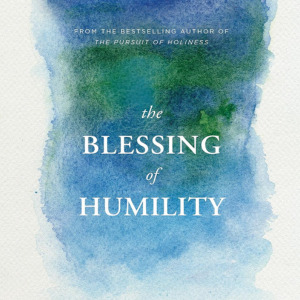
In a world that often celebrates self-promotion, pride, and individualism, The Blessing of Humility by Jerry Bridges stands as a refreshing and much-needed reminder of the profound spiritual value of humility. Published in 1996, this Christian non-fiction book delves deeply into what it means to live a life marked by true humility—not as weakness or low self-esteem, but as a Christ-like posture before God and others. More details…
#TheBlessingofHumility #JerryBridges #booksummary #bookreview #humilityinChristianity #Christianliving #spiritualgrowth #humilitydefinition #practicinghumility #humilityvspride
#the blessing of humility#jerry briges#book summary#book review#humility in christianity#christian living#spiritual growth#humility definition#practicing humility#humility vs pride
0 notes
Text
Move Over, God
Life Lessons Learned Scripture Focus: Isaiah 14:12–15 “There is nothing new under the sun,” the writer of Ecclesiastes wisely observed. Sin is no exception. We might package it differently, excuse it with fresh language, or dress it in cultural acceptability, but at its core, sin has remained consistent since the Garden. And perhaps no passage reveals its root cause more clearly than Isaiah…
#“I will” vs “Thy will#” self-exaltation#Bernard Rimland happiness study#biblical humility#biblical sin#C.S. Lewis pride quote#Christian devotion#daily Christian living#devotional blog#Golden Rule#humility#Isaiah 14:12–15#life lessons#life lessons learned#Old Testament theology#pride in Scripture#Satan&039;s fall#selfishness#spiritual surrender
0 notes
Text
In the delicate balance between pride and humility lies the true strength of the soul. 🌿 Not in loud triumphs, but in quiet surrender, we find growth, connection, and transformation. #WisdomInSilence #Humility #TrueStrength”
#Character Development#emotional intelligence#humility#inner peace#life lessons#personal growth#pride vs humility#self-awareness
0 notes
Text
Before Us
Like the house dog who howls into the air “Look at this food I have made” after his master poured it into a bowl for him, So too is man in all his self praise of his accomplishments. For the entire tasks of man is simply to “eat the fruit” all of that was put before him, from before his time, of things he did not make, of ideas that existed without him, of material and thought and arrangement far…
#Creation vs. Discovery#Divine Creation#Existential Truth#God and Creation#Human Pride#Humility and Grace#Man’s Accomplishments#Philosophical Writing#Poetic Essay#Spiritual Reflection
0 notes
Text
Self-Made PROPHETS: The Church’s New CHARLATANS?
Introduction Picture this: “Senior Prophet” flashes across a conference screen. The crowd roars, hands raised, as a polished figure strides onstage—title gleaming like a badge of honor. Now picture Elijah, trembling in a cave, or Jeremiah, weeping in a cistern, his voice hoarse from crying God’s truth to a deaf nation. When did prophecy become a platform for pride instead of a burden for God’s…
#1 Corinthians 5:12-13#Acts 20:30#biblical discernment#church corruption#humility vs pride#Major 1#prophetic ministries#self-proclaimed prophets#spiritual deception
0 notes
Text
The Importance of Humility in Overcoming Conceit
In our journey towards spiritual fulfillment, understanding the balance between conceit and humility is crucial. Each of these qualities plays a significant role in shaping not only our personal growth but also our relationships and worldview.
Overcoming Conceit: A Guide to Spiritual Discipline Ecclesiastes 1:13; 1 Corinthians 8:1; Romans 12:16; Genesis 8:21 In a world where self-promotion often takes center stage, the challenge of balancing humility with conceit is more pressing than ever. We often find ourselves grappling with the idea of how to acknowledge our own achievements without slipping into vanity. Biblically speaking,…
#1 Corinthians 8:1#Bible#Bible study on humility#biblical teachings on pride#Christian Discipline#Christian humility#Christian life lessons#Ecclesiastes 1:13#faith#faith and humility#Genesis 8:21#God#God&039;s teachings on pride#Humility#humility in faith#Jesus#lessons from Ecclesiastes#Overcoming conceit#overcoming pride#personal growth in faith#pride vs humility#Romans 12:16#Spiritual Discipline#Spiritual Growth#Spiritual Journey#theological insights#understanding conceit
0 notes
Text
"You don't have to give up your intellect to trust the Bible. You have to give up your pride."

Robert Charles Sproul was an American Reformed theologian and ordained pastor in the Presbyterian Church in America. He was the founder and chairman of Ligonier Ministries and could be heard daily on the Renewing Your Mind radio broadcast in the United States and internationally.
Theologian and Author: R.C. Sproul was a prominent Reformed theologian and author known for his extensive work in Christian theology. He authored numerous books on theology, biblical interpretation, and Christian living, including notable works such as "The Holiness of God" and "Chosen by God."
Founder of Ligonier Ministries: Sproul founded Ligonier Ministries in 1971, a Christian educational organization dedicated to teaching the Reformed faith through resources such as books, conferences, and broadcasts. The ministry is named after Ligonier Valley, where it was initially established.
Teaching Pastor: He served as the teaching pastor at St. Andrew’s Chapel in Sanford, Florida, where he was influential in shaping the church’s theological direction and providing teaching and preaching that emphasized Reformed theology.
Popular Speaker and Teacher: R.C. Sproul was known for his engaging teaching style and was a frequent speaker at conferences and seminars. His teaching reached a wide audience through radio programs, such as "Renewing Your Mind," and his teaching series were widely distributed.
Reformed Theology Advocate: Sproul was a staunch advocate of Reformed theology, emphasizing doctrines such as the sovereignty of God, the authority of Scripture, and the importance of understanding and teaching core Christian doctrines. His work contributed significantly to the spread of Reformed thought in contemporary evangelicalism.
#R.C. Sproul#Trust in the Bible#Faith and Reason#Intellectual Faith#Pride#Biblical Authority#Christian Theology#Apologetics#Humility#Religious Belief#Biblical Interpretation#Theological Insights#Spiritual Growth#Faith and Intellect#Christian Wisdom#Pride vs. Faith#Rational Faith#Biblical Understanding#Theological Reflection#Christian Thought#quoteoftheday#today on tumblr
0 notes
Text


“Solas always thought Mythal would join us eventually, that she was better than the rest of the Evanuris. He made this place so she would be comfortable once she joined the rebellion. Now it’s too late.” -Felessan, a refuge for Mythal
“For whatever it’s worth, thanks for the castle.” - Inquisitor, Tresspasser
“For whatever it’s worth, you used it well.” - Solas (high approval/romance), Tresspasser
*screams from a tortured solavellan in the distance*
Also, can we please talk about the difference between his “Inquisitor!” vs “Mythal…” when they both show up at the end of veilguard? He addresses high approval inky with surprise and respect, turns his head away so they can’t see his bloody and blackened face. But it’s just the WAY he says their title, like he’s disappointed the only person in the world he might still look up to.
But his “Mythal…” sounds dreadful, almost like he’s going to be sick. He curls in on himself, eyes lowered, dagger raised for her to take like a beaten dog. It was devastating to watch someone we’ve always seen carry themselves so high be brought so low. But suddenly…it made sense as to why he never seemed to relax in inquisition, why his shoulders were always pinned back and his chin held high. It was humility that came first, then pride.
The humiliation of reducing his spiritual nature to a physical form, the humiliation of finding all his long sought wisdom being ignored, of a pure intent being corrupted, of all his painstaking effort being for naught….the humility of knowing he was once foolish and soft enough to let himself be used for an agenda that was not his own. To know that you once loved someone more than they loved you…and that when you gave them all, they gave you nothing.
“Or maybe…I’m the prideful one; imagining his broken heart so I never have to face my folly.” -romanced Lavellan.
Here we have Lav seeing right through Solas without even trying to because they are one of the same reflection. But there are two key differences that stand out to me, the first being that Lav is willing to table her pride to face this pitiful truth about herself head on…while Solas is still too ashamed to, even after all his long centuries.
The second is Lavellan is wrong; she was not imagining Solas’ broken heart over what he did to her, while Solas was imagining Mythal’s (or at least inflating it beyond truth) not only over how she treated him, but the rest of her people. “You saw the understanding Solas cultivated like a tree twisting to reach the sun.” Mythal always knew he did not see her for what she truly was. He never would have joined her if he had. Because both Lav and Solas know what it is to stare at themselves in the mirror and doubt, while Mythal and all the rest of the Evanuris did not.
“Their arrogance is half their binding,” Solas will write about the Evanuris in regard to the prison. “She was the best of them,” and yet, “They were arrogant and fickle.” She never stopped being one of them. She never wanted to. They turned on her…not the other way around, as it should have been.
“Solas always believed Mythal would join us eventually, that she was better than the rest of the Evanuris” - Felessan (a still doubtful former slave/supplicant of Mythal, and rightfully so as she NEVER joined…not even in veilguard, never wholeheartedly.)
I don’t really have any point to make here with this, just musing at the contrast between Solas’ leader/advisor dynamic with the Inquisitor vs Mythal…and how much better one was to him than the other despite not having lifetimes of history together.
A blazing light was brought to that refuge’s beacon eventually…just not from the source he’d been expecting.
#solas x inquisitor will always be my favorite DA relationship platonic or romantic#solavellan#mythal critical#solas#dragon age inquisition#dragon age the veilguard#inquisitor lavellan#inquisitor trevelyan#mythal#solythal#solas analysis
169 notes
·
View notes
Text
"THE EX-MORNING" AND KARMIC CYCLES
Y'know, I think there might be some Buddhism going on in this series made in a country where Buddhism is super influential to the culture.

I'm tagging @hallowpen in case they want to critique or add anything since I'm basing most of this on conversations I've had with them about karma and Thai culture. \:D/ (Baby's first Buddhist meta!)
Okay so here goes: I think we could be watching a story about breaking karmic cycles, lads.
Like, here, I went back to episode 2 and rewatched this scene:
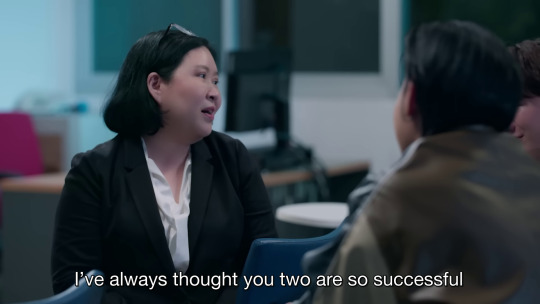
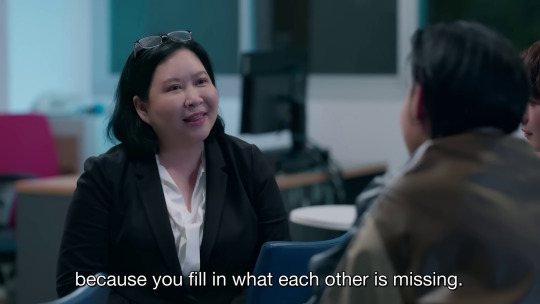
Their professor tells them that they complement each other because their strengths and weaknesses align. So when they're in balance, they're perfect together.

The trouble is that they weren't balanced. Because of Tam.
We also have Yong emphasizing the same point in the last scene of episode 2:
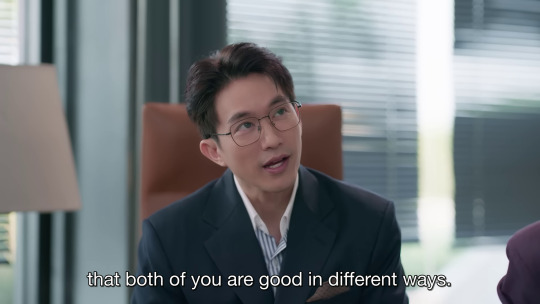
He says, "This clip has shown me that both of you are good in different ways," which is, crucially, the first time he's recognizing this about them. I mean, one could argue that based on the flashback in episode 7, Yong has been under the impression that Phi was dependent on Tam.
Not the other way around.
See, what I really like about Tam's reason for leaving is that it was selfish. Because he also has an arc. The bigger arc, actually, because Phi has basically completed his now.
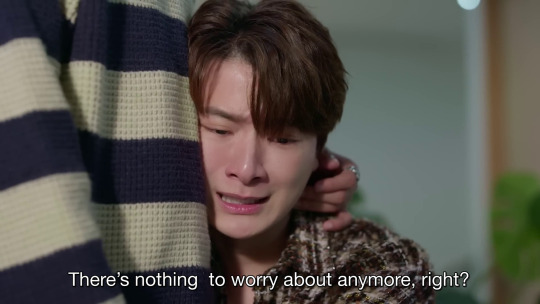

This is where I think Phi's main arc ended.
Hear me out!
Tam is his arc. I know some viewers raised an eyebrow at Phi asking Tam to get back together before he knew the reason why Tam left, but I think he made the conscious choice to reconnect without knowing as a gesture of forgiveness. 1) Buddhism is heavy on forgiveness, and, maybe more importantly: 2) Phi broke his karmic cycle and narratively earned himself his relationship with Tam back.
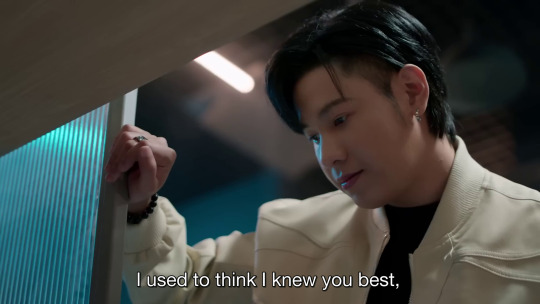


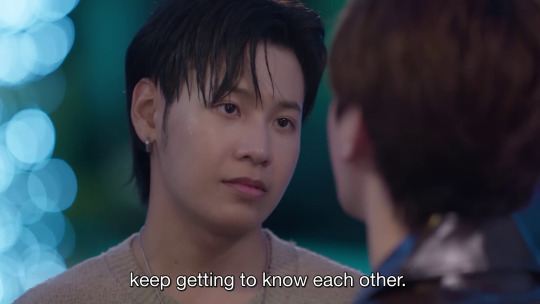
Phi tells Tam that he thought he knew Tam better than anyone, but he knows now that he was wrong because he was still blindsided by what Tam did to him. They couldn't get back together without something changing first, and it's this: having recognized that his pride was part of their weak foundation, Phi opens up to Tam through his newfound humility. His only condition for them getting back together is that they resolve what he seems to see as his biggest failing in their relationship: his ego.
Narratively, Phi was always going to get back with Tam not just because it's a romantic comedy and duh:
But because from the moment they met, Phi has literally never wanted anything more than he wants Tam.
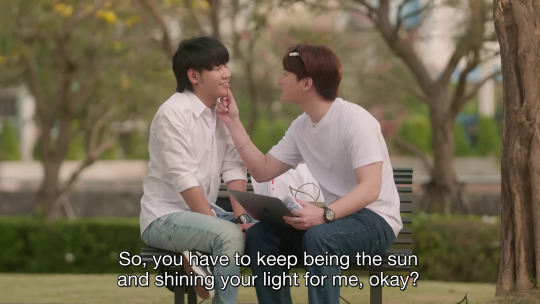
Tam is Phi's sun, and Phi is Tam's world. They're quite literally named so they're connected (Pathapi: "earth", Tamtawan: "following the sun"). Without Tam, Phi has no vibrancy, and without Phi, Tam has no purpose. But together, they also run the risk of being too codependent.
Hence: balance.
Phi was established from episode one to have a want vs. need arc: he wants his career back, but he needs Tam. Now that he has his need resolved (Tam), he'll likely spend the remaining episodes trying to get his want (career).
This means, delightfully for me, that Phi is a false POV character.
Because this story's central character is actually Tam.
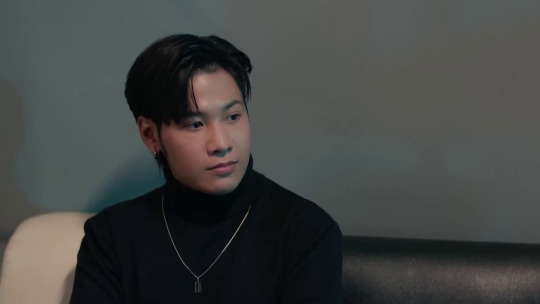
[we all miss the turtleneck don't we]
The title of the series refers to Tam.
The English title is "The Ex-Morning" (the name of the show they're creating) but the Thai title is: "The Ex Always Changes" (which is based on a Thai phrase about the weather being mercurial), so this series is definitively about Tam. That's why his overall arc is the bigger one, the one that took longer to unpack, and likely the one that'll stretch to the end of the series.
Tam's arc is about breaking his own karmic cycle in which he continually gives up everything he has for Phi's benefit.
It's literally part of Tam's song "Consent":

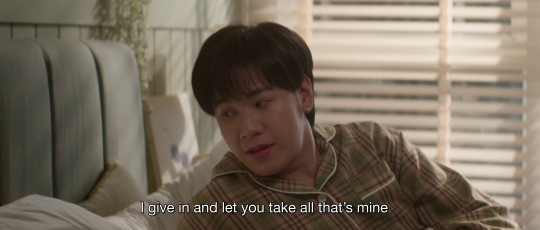
He doesn't like living like this. He's painfully aware that from the start of their relationship, he's always prioritized Phi over himself to his own detriment, and he knows it's making him miserable.
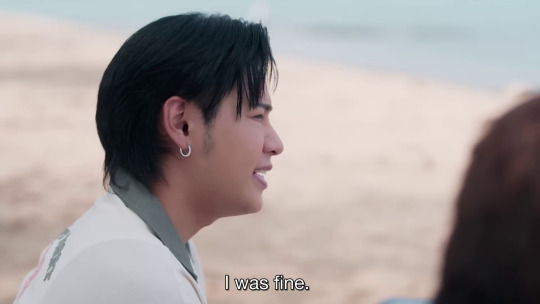
Buuut he's still not being totally honest about it. So his character arc isn't done. As of episode 7, he's only now trying to take a step back so Phi can stand on his own.
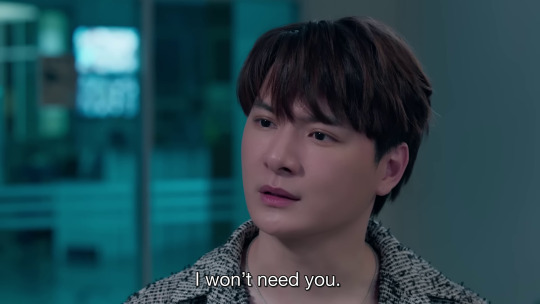
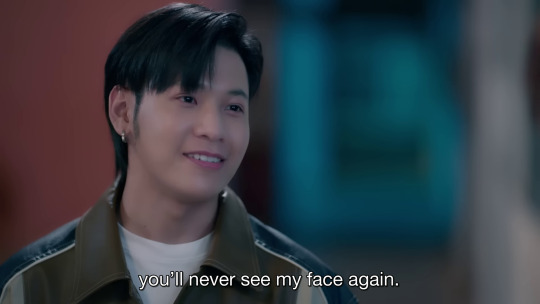

This scene in episode two has a whole bunch of new meaning to it now that we know what we know about Tam as a character. Initially, I wondered what Tam's tone was when he says, "If I lose, you'll never see my face again. Are you okay with that?" I think he's literally offering this to Phi. As in, "Not only will I quit, I'll leave, and this time I won't come back or bother you again."
Obviously, this isn't what Phi meant, and it's clear from both of them crying afterward that it's not what either of them actually wants.
But it shows that from episode one, even after four years apart, Tam's still as self-destructive as he was when he made the choice to leave.
After one critique from their boss, Tam gave up his career and his home in the name of Phi's success. And he valued himself so little in the process that he didn't expect it to shatter Phi the way it did.
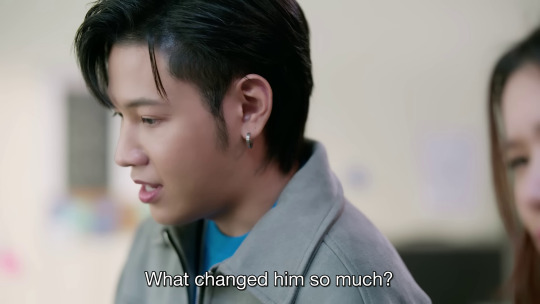
The one bit of evidence Tam had to back up this assumption was when he saw firsthand how quickly Phi got over his seemingly (but not actually, apparently!) hopeless crush on Paul by dating him. He went from best friend to rebound and never saw enough value in himself to realize it was because Phi actually does love him more than anyone.
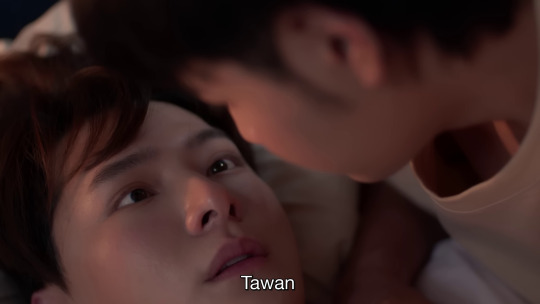
What I like most about Tam deciding to leave the country is that he didn't do that part for Phi. Tam left Thailand because he didn't trust himself not to try and do everything for Phi again.
In this episode, we saw that his "let's break up" text was deliberately hurtful. He started out with something much, much kinder, if still cowardly. (Breaking up a loving, three-year relationship by text is only okay if you're trapped in an avalanche, kids.)

Tam was so convinced he was going to hurt Phi's chances at fulfilling his dream that he deliberately texted Phi in the way most likely to hurt him so Phi wouldn't try to get him to stay. Tam, in all his twenty-three-year-old wisdom, probably expected Phi to recover the same way he did when his crush on Paul seemed to fall through.

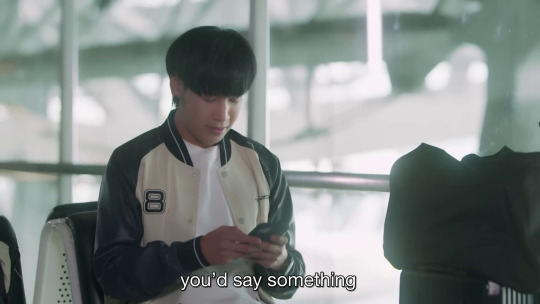
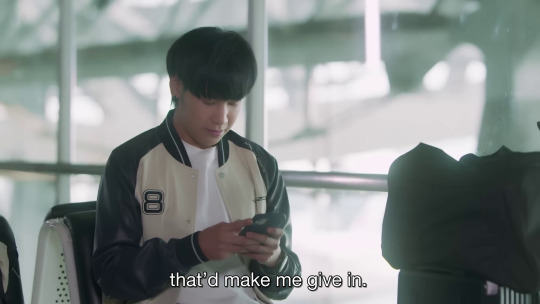
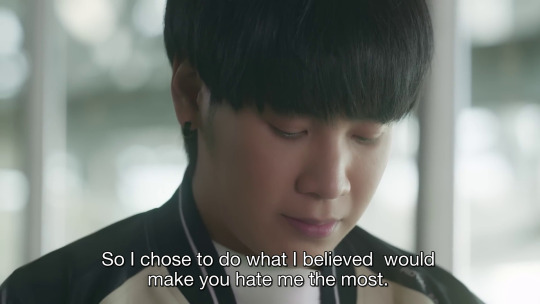
One could argue (and I am!) that Tam was much more dependent on Phi than the reverse. (And it might explain why Tam's mother isn't a big fan of Phi if she thought Phi was actively taking advantage of Tam rather than just, y'know, being aggressively coddled by her son.)
That's why Tam doesn't stand up for himself when Phi confronted him: he doesn't think he was in the right for what he did. He starts the episode by saying it was the worst mistake of his life. He calls himself the villain! But the reason he did it is consistent with everything we've seen of him.
He values Phi over himself every single time an opportunity presents himself.
And I think he didn't tell Phi in the bathroom scene in episode three because he didn't want Phi to know that Yong chose him over Phi while Phi was willing to humiliate himself to get his career back. It would have been genuinely cruel to do that to him considering what he'd just experienced.
I suspect Tam was planning to tell Phi after Phi's career was back on track.
But I also think Phi nailed it in this part:
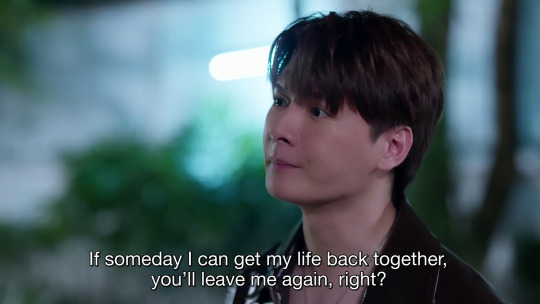
I don't think Tam ever intended to come back to Thailand when he decided to leave, and I think he might have actually wanted to leave again when he thought Phi had everything he needed.
I think that changed as they spent more time together and Tam just wanted to have Phi back, but for real: I do not think Tam had a plan. One phone call from Yong and Tam left Australia to start his post-graduate career helping his ex resurrect his broken career. I think he's making this shit up as he goes along, lads. Hence all the "Ex Always Changes" thing.


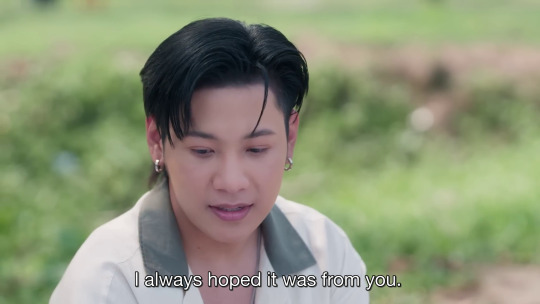
I ran out of screenshots but this part is also crucial. Tam admits the contradiction of blocking Phi everywhere so he wouldn't be tempted while also saying every text and phone call made him hope somehow it was Phi. He says it only took one call from Yong to bring him back to where he was.
In response, Phi tells Tam that time doesn't make you forget, it just makes you strong enough to remember what we've been through. (Which is a banger of a line, holy shit.) Which lines up perfectly with all the flashbacks we've been getting to show us what their relationship was like and why it fell apart.
Episode three is completely about karmic cycles. The series literally shows us a transition from Phi and Tam arguing in university to arguing in the same way in the present. They were stuck in a pattern of behavior, and only now has Phi broken free of a major one.
Tam's is next.
Because despite the premise of the series making it seem like Pathapi is the one who has the most to change, Tam is actually much further behind in his arc. All Phi needed was, frankly, any support system since Tam was not only his boyfriend but his only actual friend (lol).
But Tam's need is more abstract than that, so it's gonna take him longer to get there.
As for the meta aspects, it's not a perfect one-to-one with KristSingto's lives, but it is related. PhiTam are the same age, but Singto's a year older than Kit, and through their first chapter working together, Singto clearly felt like he had to take care of Kit in a lot of ways. He was his nong from school and now, even though they were both new to the industry, Kit was still younger, more carefree, and also a notorious people-pleaser, so he did frankly need someone like Singto to ground him. But Singto's said he tried too hard to be cool, to appear unaffected, and he's doing that less now. He's loosened up a lot, and I think it's because Kit matured. Obviously Kit still adores him and needs him to a degree because we all have people we need, but he's not dependent on him anymore. They're strong as individuals now and working together by choice, so in that regard, I think the parallel to PhiTam works beautifully.
I continue to love my domestic little series about exes who are cosmically obsessed with each other. :')
TEAM TAM!!!
#krist perawat#singto prachaya#kristsingto#the ex morning#phitam#phitawan#pathapi x tamtawan#the ex morning meta#team tam
98 notes
·
View notes
Text
The North Node & The Choices You Make
The North Node paints a picture of our choices in life, especially when connecting these choices to one's destiny, your path in life. All choices have a cause and effect, but the North Node focuses on major decisions that pertain to your growth or your "soul's growth". I think you could somewhat compare it to something like a "canon" event or decisions.
Aries North Node may present challenges and choices revolving around identity and independence. The uncomfortable, risky, or scary decisions one may have to make tend to revolve around self-expression, bravery, and standing on one's own.
Taurus North Node involves making choices around and facing down paths of fear, jealousy, and possessiveness. Security is the key word for this placement. Temptation towards safety vs. their natural determination will be a common struggle.
Gemini North Node is going to face many questions and challenges revolving around truth and lies. Facing the truth about themselves may be the biggest challenge for this node. Their life-changing or "canon moment" choices tend to revolve around self-expression, opinions, and the information/knowledge they consume.
Cancer North Node may be confronted with large choices revolving around taking care of their needs vs. someone else's. They may also get stuck at crossroads involving suppressing their needs or emotions vs. tending to and expressing them.
Leo North Node may find they run into challenges or choices that either empower or disempower them. Their passion and integrity may be tested often. Following their heart doesn't always come easily, but it is a temptation, a call for them, maybe destiny.
Virgo North Node tends to run into the question of to help or intervene or to not? Humility vs. pride, following vs. leading, tolerance vs judgment, and even support vs. sabotage are themes that can exist for a NN in Virgo. They are after fulfillment, reward, validation, recognition, appreciation, but most of all a real cause to serve and be apart of.
Libra North Node cannot underestimate their choices in terms of relationships and the people they surround themselves with. Balance, equality, giving and receiving are major themes here. Their hardest choices may revolve around being part of a partnership or not.
Scorpio North Node tends to be pushed towards self-mastery in many ways. Some of their hardest choices in life are highly introspective such as setting boundaries and rules for the self, diving into secrets and the subconscious, as well as testing and breaking their own limitations.
Sagittarius North Node may have to make difficult choices about their beliefs. Choices, consequences, and different paths they may go on are highly dependent on the knowledge they seek or ignore. Their curiosity and thirst for more may present more questions than answers throughout their life.
Capricorn North Node will face tough decisions and choices based around authority - especially their own authority. Rebellion, self-reliance, mentoring or finding a mentor, and taking accountability may be highly uncomfortable or scary for them, but result in some of their biggest changes.
Aquarius North Node may be asked to make choices that increase their adaptability. They might be forced often to make quick decisions due to the unpredictability of life. Evolving their identity and/or ideals can be highly uncomfortable or strange to them, but they may be dealt cards that ask them of this over and over.
Pisces North Node may have to deal with some of the more abstract or vague choices out of all the nodes. Asked to make choices revolving around their spirituality and/or their connection to nature or other people. As they grow and go through life choosing to practice empathy, introspection, or sensitivity are brought up often.
#nodes#north node#zodiac#astrology#zodiac signs#aries#taurus#gemini#cancer#leo#virgo#libra#scorpio#sagittarius#capricorn#aquarius#pisces
359 notes
·
View notes
Text
Branching off this post a bit, specifically Sebastian as the big bad wolf, there was something I noticed from using google translate on chapter 107.
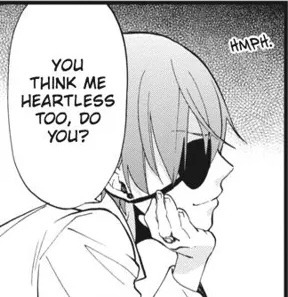
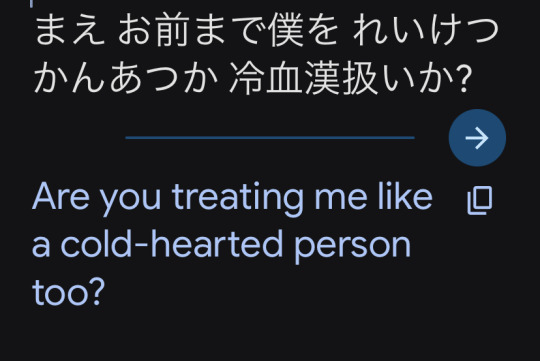
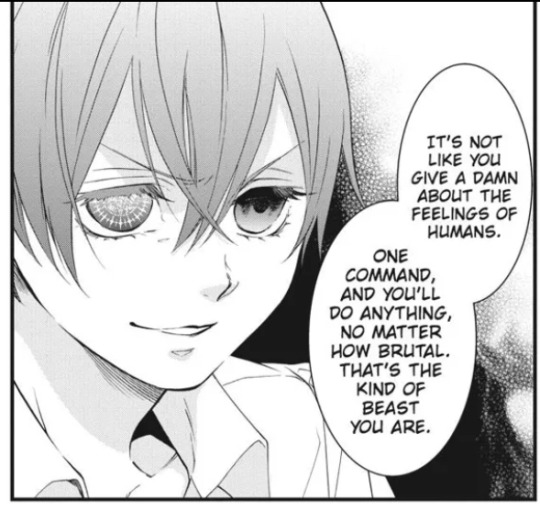
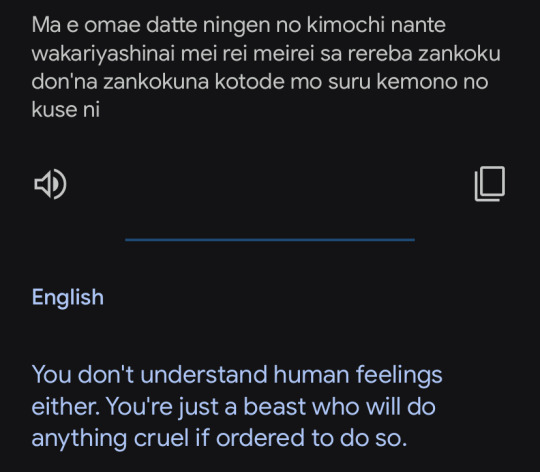
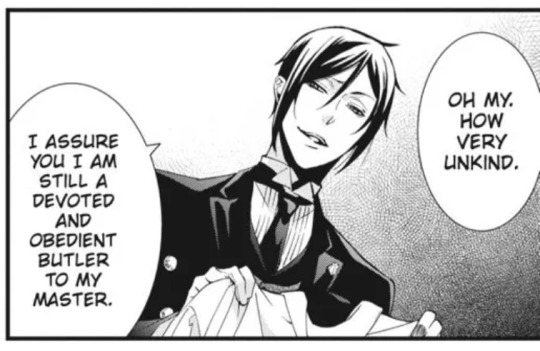
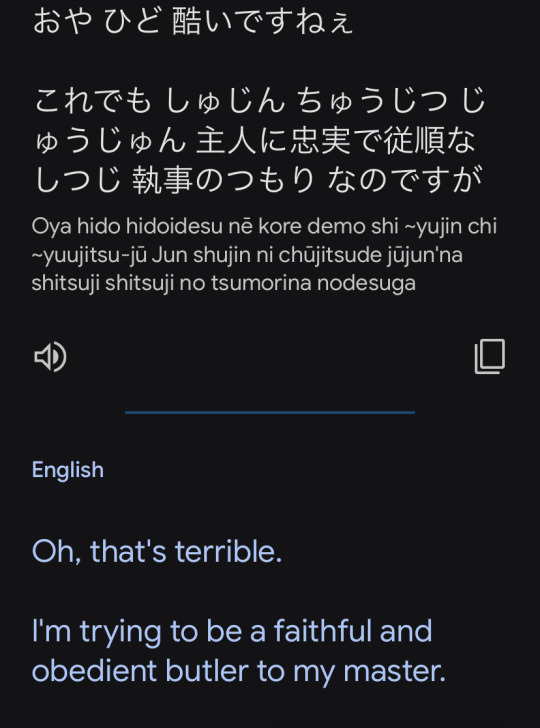
I cannot tell you if these are more accurate or not, I cannot read Japanese. I’m also fairly sure that there is no official translation of the special chapter following the murder arc, which is what I’m going to compare it to:
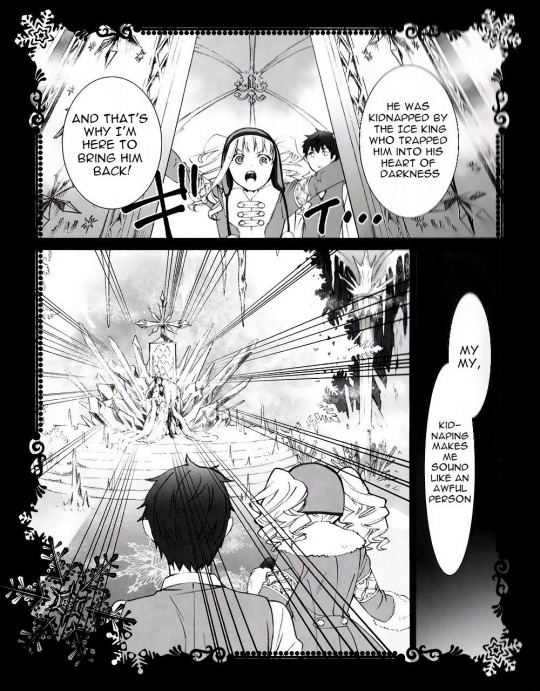
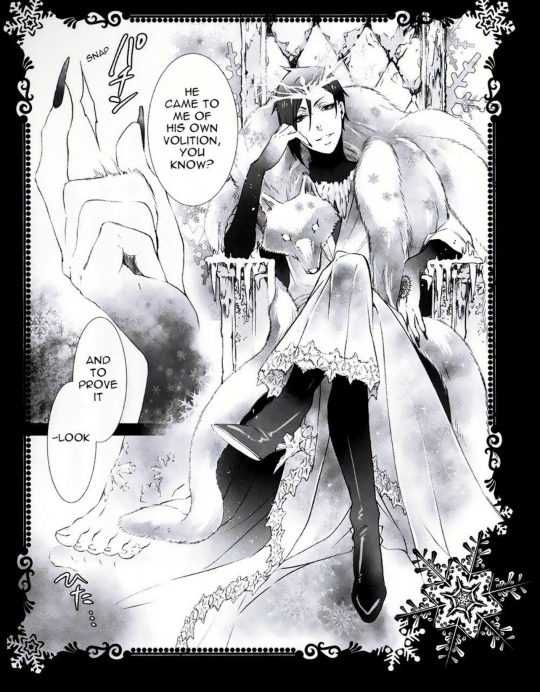
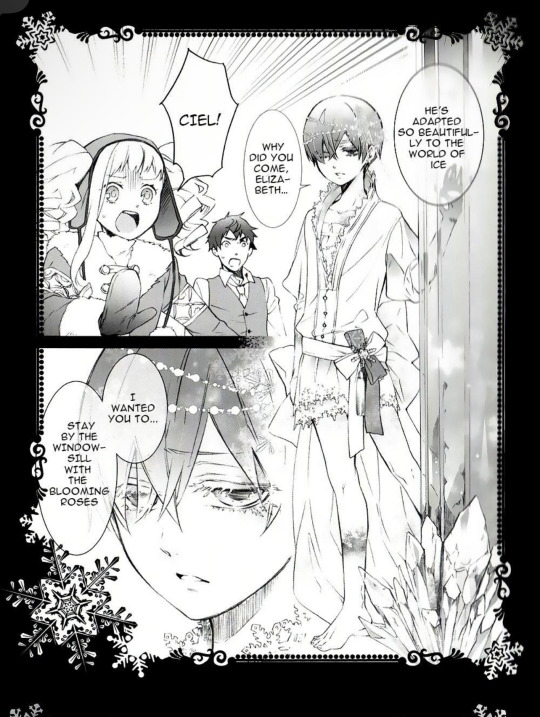
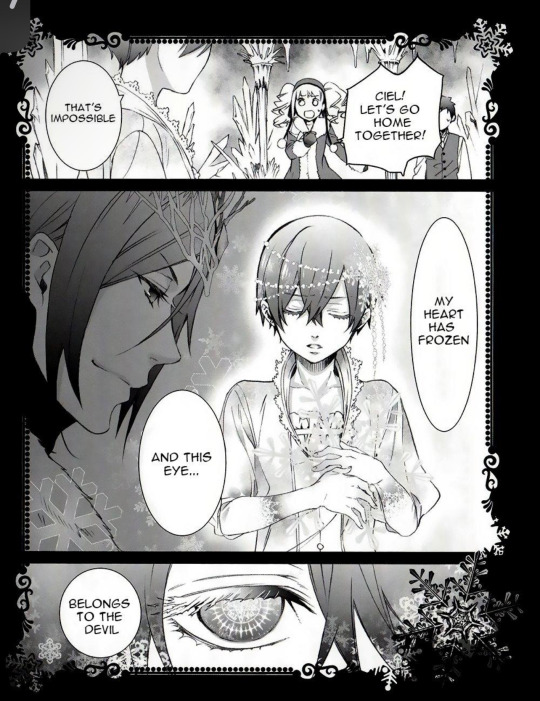
This part of Sebastian that seems genuinely impulsed to shield himself from these sorts of accusations and take pride (or at least find validation in?) the excuse that it’s all Ciel’s choice; Ciel knows his true nature, yet he still chooses to ally himself and depend on him anyway. I’ve never been able to decipher if it is Yana using Sebastian’s voice to tell the reader how we are supposed to understand their dynamic as a rule, or if it is truly Sebastian’s cope. She has said a couple of times that he is incapable of shame and he’s said that he’s incapable of emotions, and I don’t know, it could just be poor writing on her part- I never thought of him as having the same characterization as Ryuk from Death Note. He does not seem detached, and I don’t know why he has such a habit of being defensive or annoyed when he’s perceived as some sleaze with the qualities you’d expect from somebody who prides themselves on being, well, devilish.
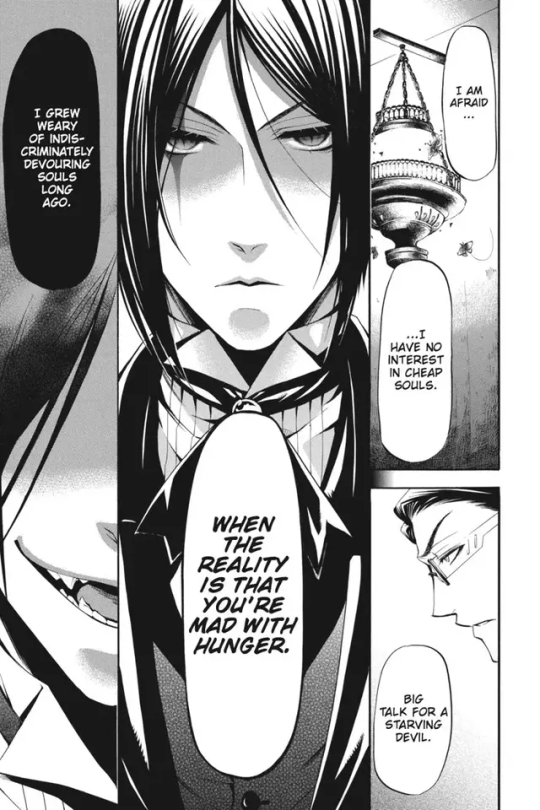
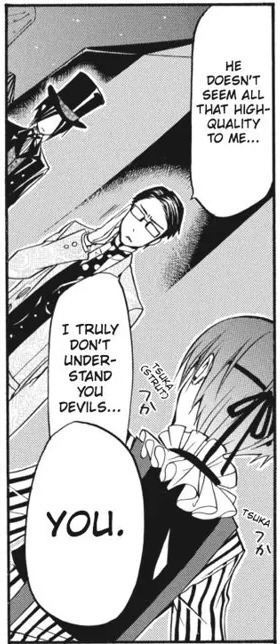
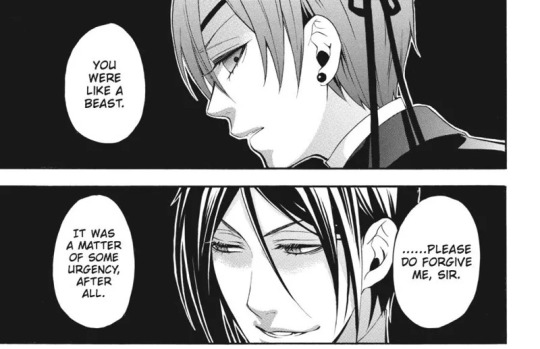
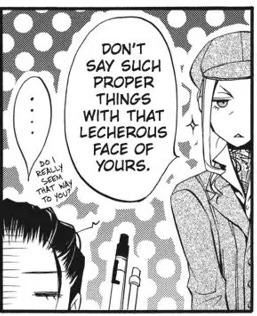
It would be pretty boring if it turned out to just be Yana’s cope instead of Sebastian’s. For a manga that harps on Facing Truth vs Willful Ignorance to allow its most smug, nihilistic character to never be challenged with self reflection and still win in the end. I think Ciel has to constantly contend with it- more than even the readers have, since I still see the most popular takeaway from the Green Witch Arc to be “Sebastian doesn’t care, he only wants Ciel’s soul.” all these years later. I still have a post about that in my drafts that I’m struggling to condense. Basically, with themes like these, it’s all too reassuring to have a premise spelled out to you which 1. Gives you permission to victim-blame Ciel for the sake of having this premise and 2. Tells you point blank not to think twice about any of it’s characterizations, just take them at face value.
Rereading Chapter 35 on black-butler.net, there was a subtitle that I hadn’t seen before

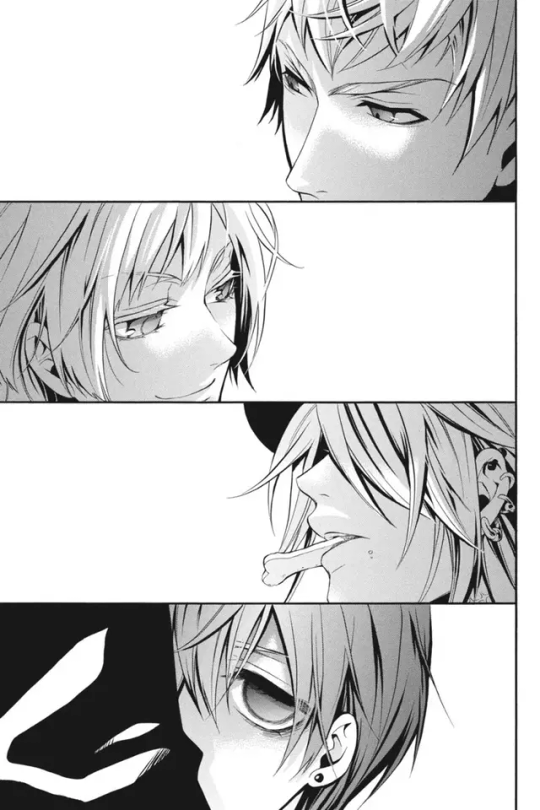
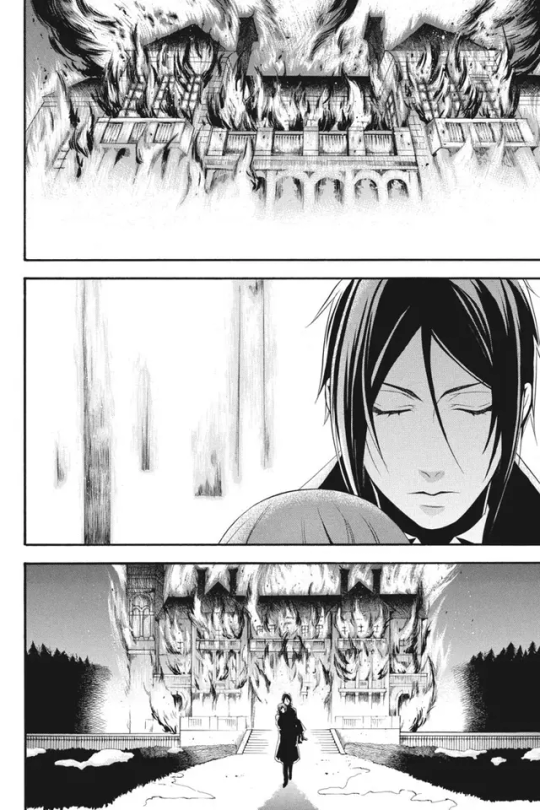
I would appreciate it if anybody had more information on that, like if it was in the japanese version when it was originally published in square’s magazine, or something.
…
I think the true development is that Ciel continues to make strides in accepting himself and Sebastian for what they are, but that never has to dictate WHO they can become- what choices they can still make. Much like all of his servants and allies. No matter how far gone and irredeemable Ciel believes himself to be, he is still giving orders like this:
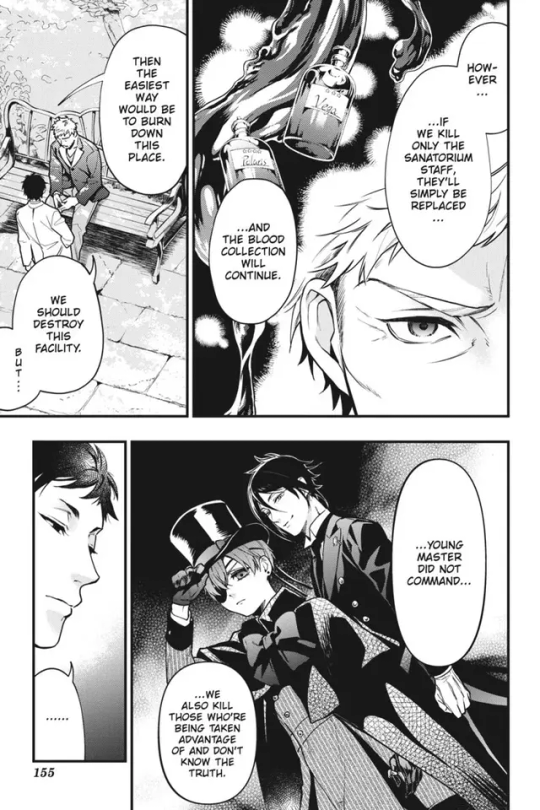
He is not descending into the depths of depravity, his humanity has resilience. It continues to expand, beyond his capabilities of even the earliest chapters. So much that it even extends to Sebastian.
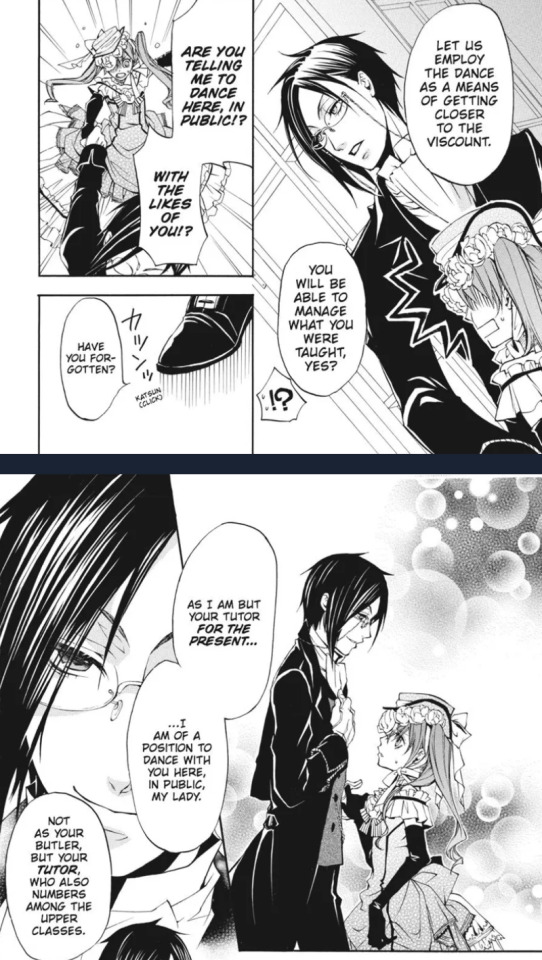
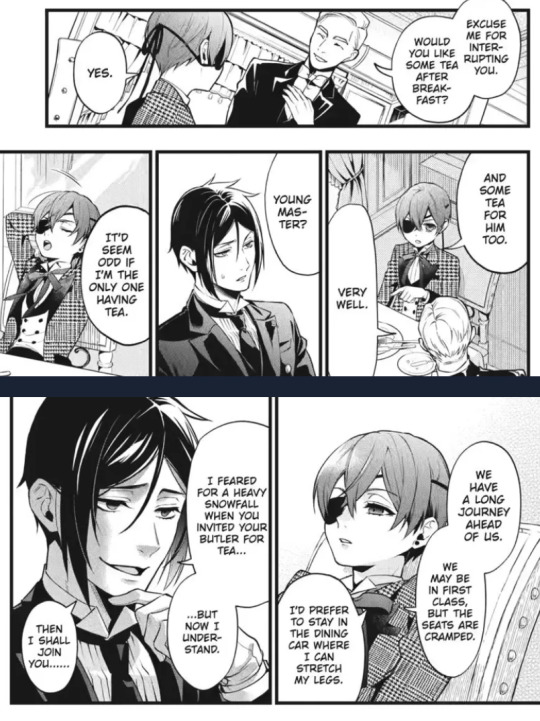
Which I don’t expect to be something that Sebastian has no appreciation of. Going back to where I started, with chapter 107, some humility and compassion was all Sebastian was asking for.
#I don’t know how into philosophy Yana is but bearing witness is actually pretty significant to Abrahamic religions Lawl#kuroshitsuji#black butler#sebastian michaelis#sebaciel#(adjacent)#kuroshitsuji meta
65 notes
·
View notes
Text
'solas wants to see himself as the hero, it's just easier to play the villain' and he's rocking up to help the shadow dragons that rook left behind and playing the hero after stuffing rook in a fade prison like... THE JUICE IS DELICIOUS IN THIS INSTANCE, I HAVE TO SAY.
shadow dragon rook that doesn't save minrathous and then has solas showing up in the finale to help the shadow dragons is just... LOL... icing on the cake of their relationship truly...
#leaning hard into that rook and solas parallels in this worldstate#bc while brendan and solas are besties!! i also think they're polar opposites#like i said i accidentally came away from inquisition as having them as a pretty blatant#'pride vs humility' dynamic#so i have to give solas a rook thats just a funhouse mirror reflection of his younger self here i think
1 note
·
View note